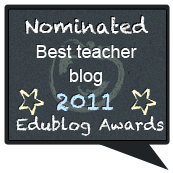
In case you can’t tell by the content of each of my posts this week, my students started blogging on Monday and we are all pretty pumped about it. While I am nowhere near as experienced as some of my inspirations – Greta Sandler, Pernille Ripp, Linda Yollis, and Kathleen Morris, just to name a handful – I have seen enough enthusiasm and possibilities from my students that I feel I can present this list of 10 reasons your students should be blogging.
1. Blogging is a confidence builder. My students are tremendously proud to have their words featured on the internet. There is still a bit of disbelief in their eyes when they open our site and see their name with comments. The fact that they type with their own fingers and have people around the world consider those words important enough to comment makes them feel super special. The more people delivering that message to our students, the better.
2. Blogging is cross-curricular. Blogging is authentic writing and reading. Because it’s authentic, the buy-in is much greater than traditional school experiences in those subjects. But aside from the obvious, blogging helps develop a sense of geography as you learn the places around the world from which commenters and other bloggers write. Comments can be counted, graphed, and worked into word problems (how many more comments did Joey receive than Sandy, etc.) Blogging might even very well become my secret to teaching grammar and the finer points of punctuation that seem to vex students and those who try to teach them. Then there’s the whole digital citizenship element of blogging: students who blog need to learn and be vigilant about internet safety. (I am among the growing crowd that believes we need to embrace teaching technology and how to use it safely, rather than the cohort that only sees the potential dangers).
3. You can grow your own personal learning network. This was something I didn’t really anticipate, but given how Twitter works, I should have. First, if you do decide to blog with your kids, you’ll need to get them exposure by tweeting at #comments4kids. From there, cool people from around the world will comment, reply, retweet, and share their own students’ blogs. You’ll make connections as a neat little byproduct of your students’ efforts.
4. Increased exposure of your students’ talents in the school. Two days ago I wrote about my colleagues’ interest in the student blogs. Blogging is allowing my students to, in a way, show off to others just how wonderful they are. Administrators have also chimed in in the comments section, praising the kids’ work.
5. Authentic writing for authentic audiences. The writing is authentic because kids are writing about whatever they want. Even if I decide to give them prompts or topics to write about, they know teachers and other students will be reading them – not just me. Again, it’s all about their investment, and no doubt knowing you have an audience waiting with baited breath to read what you have to write is something that motivates.
6. Exposure to today’s technology that students might not otherwise get. Most of my students don’t have computers at home, and in many cases, they will not be heading to the library to blog. So, by bringing out laptops in school and putting them on the web, students are getting an experience they, truly, might never otherwise have. That’s a powerful thing. For now the novelty of blogging is fresh, and as long as school remains the only place for students to blog, I imagine it will remain so.
7. Collaborative experiences. I have five, maybe six computers for 11 students. This sounds like a pretty good ratio, but it still means not everyone can blog at once. In the interest of fairness, kids do sometimes collaborate on blogs. Doing this, they need to decide on a topic, take turns, converse, help each other spell, share the computer, and problem solve. And when reading, it is inspirational to hear one voice joining in another on tricky words, or pointing out errors to further understanding.
8. You can build a writing portfolio for each student on their terms. This is a big one. Assume, as in our writing program, that students publish one piece per month. You wind up with a handful of pieces that are, in general, finished and polished. With a blog, you see daily or weekly progression in writing, which is a much more comprehensive display of growth than the published pieces produced in a traditional manner. In fact, I am in some ways using my students’ earliest blogs as a baseline for what they need to learn both as bloggers and writers. My paras are on board, too: the students need to write as independently as they can so that, come June, we can all look back and say, “Look how far we’ve come.”
9. Blogging levels the playing field for kids who don’t like to write in the traditional way. I have had many kids in my career who hate to write. I’ve had some success giving kids the option of using a pen, but there are plenty of students who just find nothing endearing about moving the hand in different shapes to produce letters and words. Stick a computer in front of them, though, and now you’re really speaking their language. Blogging and typing are both writing, and let’s be honest, our world is transitioning to a place where handwriting will someday be obsolete, anyway.
10. Blogging creates instant engagement. Blogging is novel to young learners, and because I don’t assign a value to what they do, there is plenty of motivation to continue. While I have my own motivations for students to blog, in their eyes it’s just something fun. They don’t realize they are doing exactly what I need them to do – writing, reading, learning. Choice plays a big role in this, too. I am able to assess and teach them using whatever they choose to write about.
If you aren’t yet blogging with your students, I hope you at least begin to consider it. If you are a seasoned veteran of student blogging, please tell me what reasons I missed. Why else must students be blogging? Please share in the comments section.











